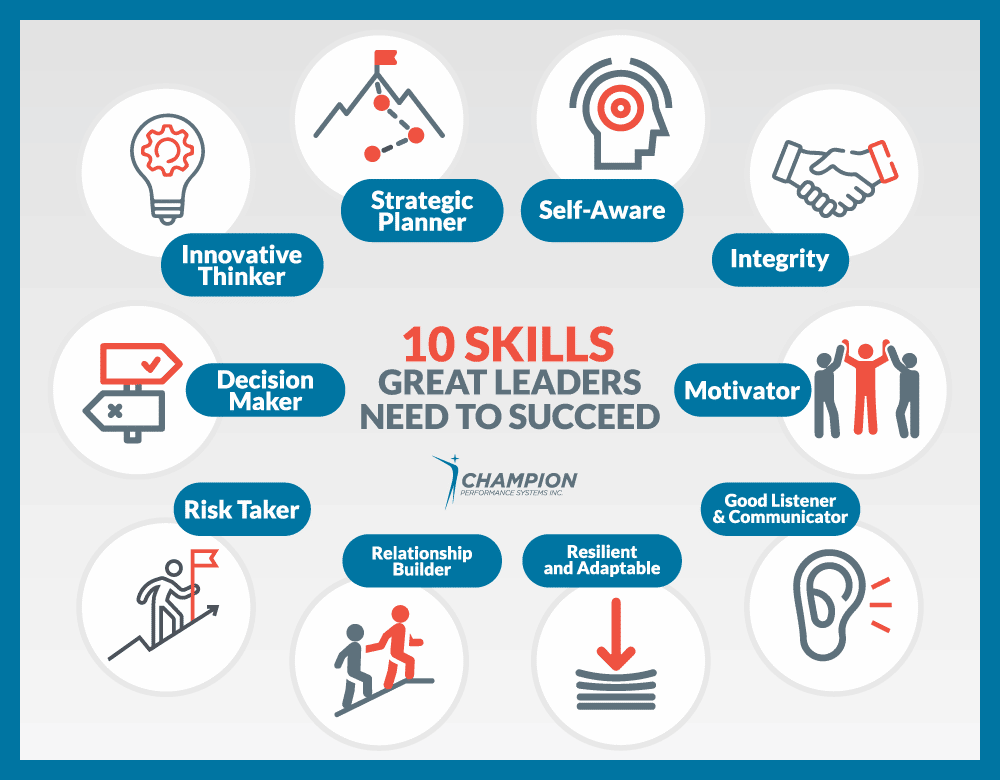Whether you’re an aspiring or current leader, you’ve likely asked yourself if a leader is born or made. You may be happy to hear that it’s a bit of both. On one hand, a person can be predisposed to leadership skills that, with correct cultivation, can make it seem like they were born for their role. On the other hand, we have seen great leaders develop through continuous grit, growth, and passion.
The common denominator between these two scenarios is that, to become a great leader, one must consistently sharpen their skill set and aim higher. A sign of a great leader is their ability to recognize signals for change and act immediately. This skill develops as you experience different environments, make mistakes, and learn to adjust for the future. This shows the importance of continuous learning and executive coaching for leaders and furthers the conclusion that true effort forges great leaders.
10 Skills for Leaders to Excel
As a leader, an effective way to learn how to become more successful is to take a look at some of the great ones and model after their tactics and leadership skills. These leaders have a foundational skill set that makes them influential. Once you hone in on these skills and develop yourself in these areas, you too can be a great leader who others will someday try to learn from.


1. Integrity
Warren Bennis, a world-renowned pioneer in leadership, identified integrity as the most important characteristic of a leader. Integrity describes more than just doing what is right. It’s honoring a moral and ethical code, even when no one else is observing you. In any instance, people want to be able to trust the person leading them.
Although it may feel more like a characteristic than a leadership skill, integrity takes consistent work and can face many threats over your career. When in a leadership position, you often have access to decisions and resources that have a great impact on everyone involved. It is possible to be tempted to make decisions based on personal gain, rather than the common good or the common goal. Learning how to maintain integrity throughout your leadership will allow you to gain trust, respect, and reliability, which all let you become more influential to those around you.
2. The Ability to Motivate and Empower Others
Motivation and empowerment are essential when leading a group of people to achieve a common goal. When there’s a goal to reach, there are often trials and roadblocks that you must clear first. These factors can lead to workers losing the motivation to continue applying themselves fully on their projects.
As a leader, you must continue to find ways to motivate and empower your team while also managing other responsibilities like task delegation, making decisions, and building relationships. Look through different seminars, classes, and other resources to enhance your motivational skills. This should be at the forefront of the skills for leaders, as ideas without the right motivation driving them usually sees little success.
3. Effective Listener and Communicator
Being a leader insinuates that you have others to lead. With that said, there will be many instances in which you will face expectations to effectively listen and communicate with your team members. When you’re in a leadership position, it’s important to learn and understand the value of listening to the ideas and perspectives of your peers and staff, as you’re all working together toward a common goal.
As an effective listener and communicator, you also build relationships with the people you’re in charge of. This contributes to a foundation of trust in your team that makes all members feel like valuable assets and contributors. In turn, this will lead to greater productivity from your team. Since you will have to communicate with several people who all have different communication styles, this is a skill that you can always build upon.
4. Resilience and Adaptability
In an ever-changing environment, it’s crucial for a leader to be resilient and adaptable. Resilience involves a great deal of flexibility, being sure that you remain strong in troubling or unforeseen circumstances. As a leader, you must keep yourself and your team grounded throughout the process of reaching your goals to ensure that productivity remains consistent in the face of adversity.
Along with showing resilience, it’s also necessary to adapt to the changes that have taken place. You have to internalize that progress isn’t linear, so you need to prepare to take on new challenges and overcome unforeseen obstacles in your path. You should be capable of quickly identifying areas for improvement when plans go wrong, so you can mitigate any complications.
Building your resilience and adaptability will make you a reliable leader and will give your team members the opportunity to grow in their leadership skills as well, as you empower them to participate in the problem-solving process.
5. The Ability to Continuously Build Relationships

Relationships are the groundwork for reaching your goals. Building relationships with your team, your higher-ups, and even your adversaries is essential for a productive workflow. Without positive relationships, your best leadership skills could prove ineffective, as you struggle to guide a group of people who don’t have a foundation of trust, openness, or respect for you. Like other leadership skills, building relationships takes constant learning and growth.
Understanding the importance of relationships and the role that they play in your framework is the key to building a team that works in conjunction like a well oiled machine. Networking puts you in front of people with different talents, ideas, and work ethics, which enables you to create a well-rounded team that is fit for success in all situations. When honing in on your leadership skills, be sure to give an ample amount of time toward learning to build relationships, continuously finding ways to reach different groups of people.
6. Taking Risks
Perhaps one of the most distinguishing factors between leaders and non-leaders is a leader’s tendency to take risks. Risk-taking, although nerve-racking, is an essential leadership skill that one must attain in order to stand out and achieve results. Research insists that risk-takers are better perceived in the workplace than those that shy away from taking risks. It shows team members that a leader is confident in their decision-making and allows a leader to show that they can easily adapt to potential outcomes of a given risk.
It is important to note, though, that this is a skill that takes a great deal of learning. Although it is important to take risks, you also need to know how to assess the possible outcomes of the risk and its effect on everyone involved. Understanding which risks are worth taking and having a plan of action for the results is essential in being a successful risk taker. Taking risks without considering all of the important factors can lead to perceptions of indecisiveness and recklessness from others — overall reducing confidence in your leadership.
7. Making Decisions

As a leader, you will need to be the driving voice of your team and the primary decision-maker. You should make sure not to take this task lightly, as any decision could be consequential and become a representation of your overall abilities as a leader. There are many factors that go into decision-making, which can make it a difficult and tedious leadership skill to grow in. However, you can become a confident decision-maker with the right resources and consistency. Lean on superiors and those with experience in similar situations, because they can help you avoid mistakes they may have made.
An important factor in decision-making is understanding the way that it affects your team. Team members like to feel involved in the decision-making process. When it comes to sharpening this skill, it’s important to find ways to incorporate your teams’ ideas and opinions into your decision-making, being sure to make decisions for the good of all and toward the common goal of the team, rather than for personal gain.
8. Innovative Thinking
Innovative thinking is a creative problem-solving skill that involves new ways of thinking and approaching problems from a unique perspective. This skill is useful in successful leadership because it allows a leader to provide fresh ideas for reaching new goals and encourages a team to think more openly and creatively. Like other leadership skills, this is one you can always learn and sharpen. However, it can be more difficult to achieve, since some people can find it more difficult to develop their creative and lateral thinking.
To build on it, learn from stories in other industries and consider how they may apply to your current problem. As you build more connections, you can create more effective, targeted solutions in any situation.
84% of executives identify innovation as a vital factor for their success. Innovative thinking allows a team or business to stand out in its industry. As a leader, proving that you can take on challenges and provide a new perspective is an indispensable leadership skill.
9. Strategic Planning

A leader can have unbeatable ideas, but they will be for naught without strategic execution. Strategic planning involves attention to detail, problem-solving, organization, and time management abilities. These are all soft skills that a leader must have and use to maximize ideas and productivity.
In a market where companies lack strategy, your strategic planning skills will prove to be a desirable attribute for executives and team members. Once you’ve developed a strategy and can effectively communicate it to your team, productivity will reach new highs, as all members know their specific roles and understand the goals they need to reach.
10. Self-Awareness and Knowing When to Take Guidance
As a leader, it’s important to understand that you’re not always the best for the job. Instead, you should be open to constructive criticism and should actively find ways to improve on your weaknesses. Once you have grown comfortable in your abilities, it can be easy to get complacent and refuse guidance when necessary. This can lead to your progress plateauing, slowing the pace of your success.
Taking it a step further, it’s honorable for a leader to personally reach out for guidance. This shows that you’re eager to learn and improve, and it can communicate your work ethic to executives. It’s also a way to demonstrate to your team members that you take your role as a leader seriously and don’t place yourself above improvement or growth. Doing this can also lead to team members feeling more comfortable with asking you for guidance and can reinforce trust within the team at every level.
How to Be a Great Leader
As a leader, it’s your responsibility to take care of yourself, your team, and your overall workflow. One of the best actions you can take as a leader is seeking out guidance in the form of executive coaching to improve your leadership skills and extend your growth to your entire team. Executive coaching will provide you with actionable advice on how to solve problems, form positive habits, build strategies, and continually improve in your role as a leader.
If you find yourself in a rut, whether that be with your personal development or the development of your business, an executive coach can help guide you in the right direction.
This is a great opportunity to show your team that you’re eager and willing to learn how to be a great leader for the betterment of the business. When your team sees you putting in the work to be better and reach your common goal, they will in turn be motivated and empowered to accept your guidance and do their part in crossing the finish line.Learn more about Champion’s executive coaching services and find out how you can join the several businesses we’ve helped reach success and watch yourself make improvements as a leader and surpass your goals.










